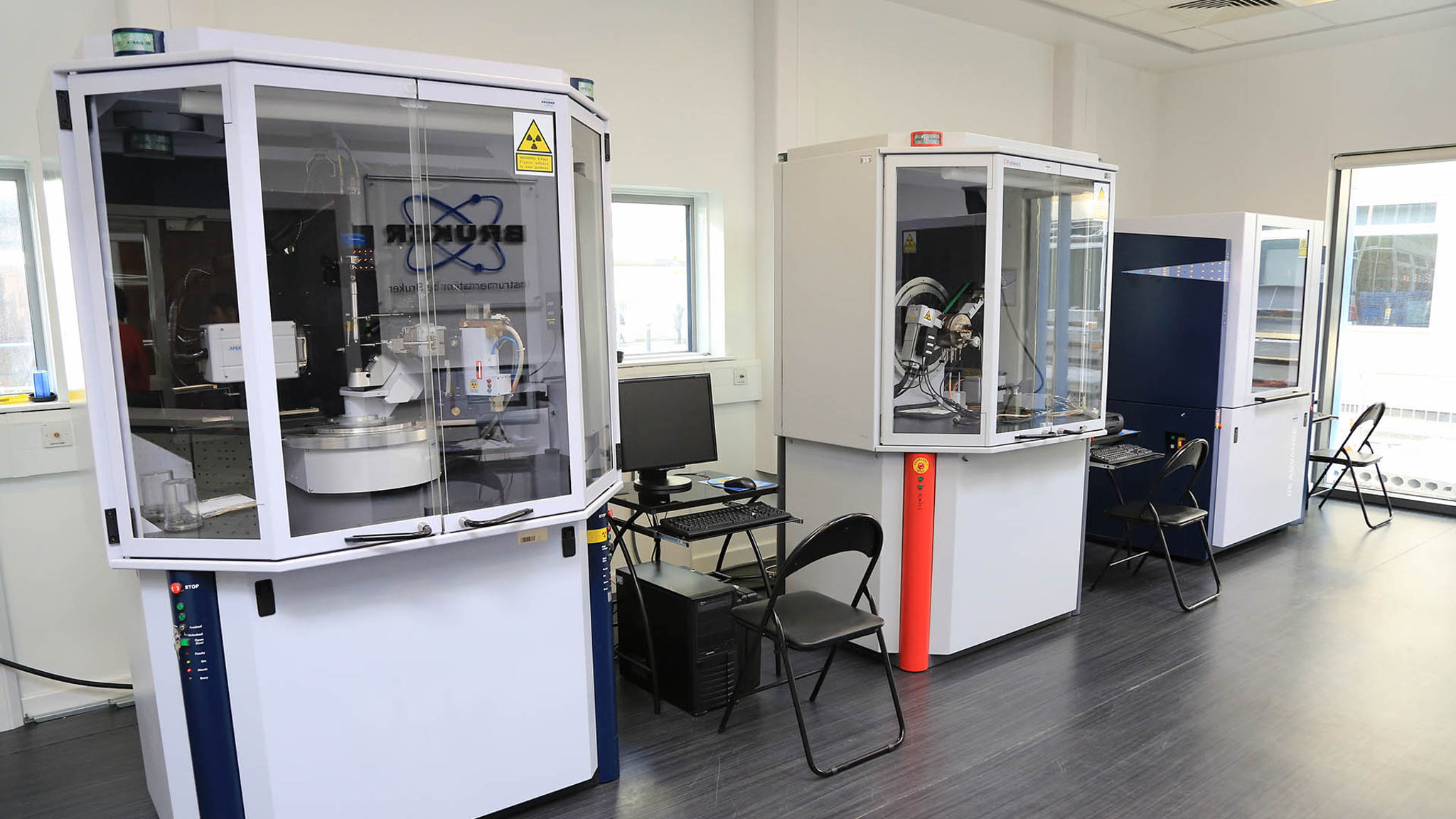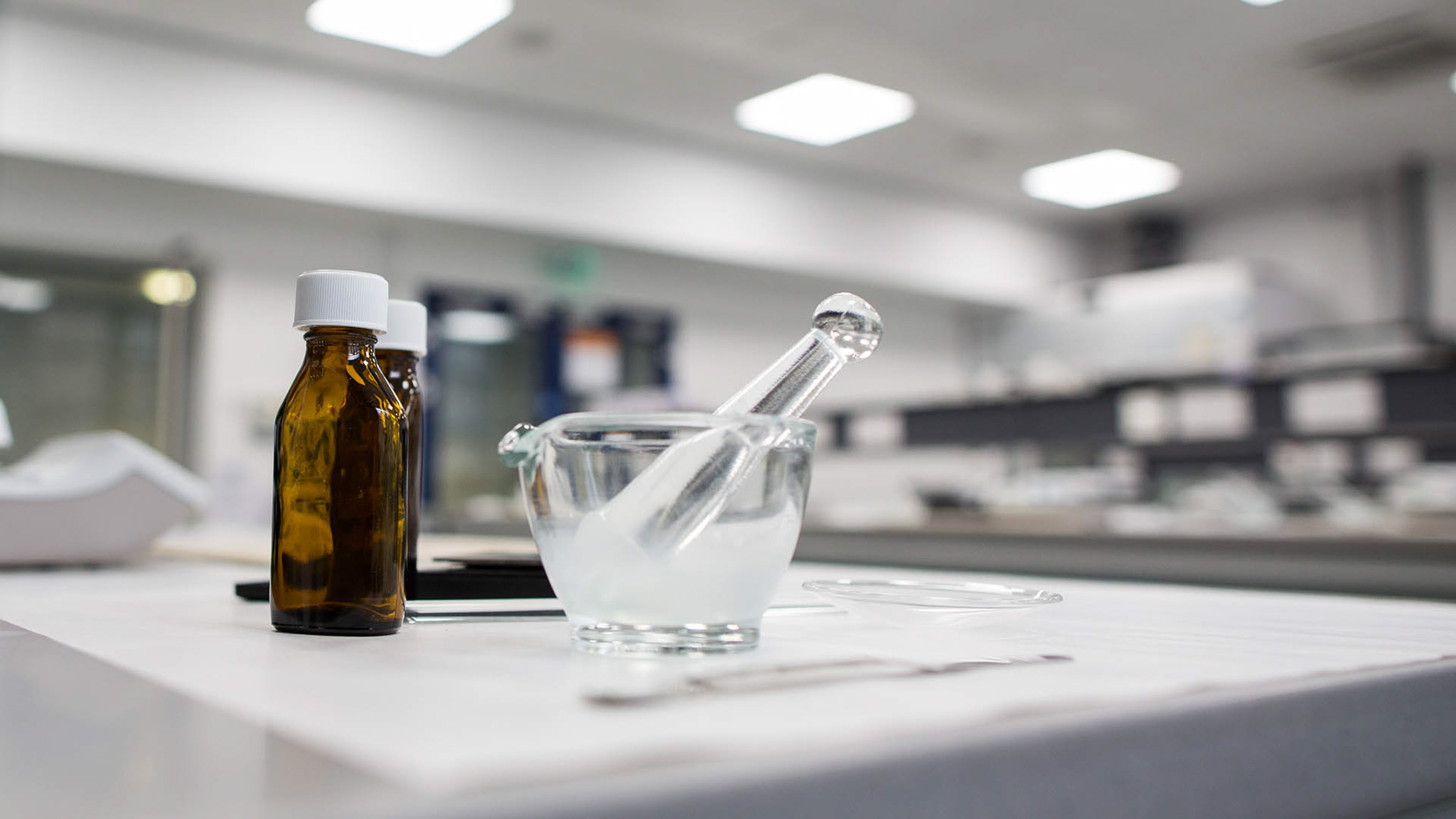
Two students working together in lab
Pharmaceutical and Analytical Science MSc
Start Dates
21 September 2026
Duration
1 year full-time 2 years part-time
Overview
Why choose Huddersfield for this course?
- You’ll gain hands-on experience with the latest technologies and methodologies used in drug formulation and analysis.
- You'll study a wide knowledge base, which will prepare you for roles within the pharmaceutical and analytical science fields.
- This course is designed to maximise your learning experience, with dedicated teaching time as well as hands-on project work.
Are you looking to meet the growing demand for skilled Pharmaceutical and Analytical Scientists in the pharmaceutical and related industries?
Our cutting-edge course, crafted with insights from experienced Pharmacists and Pharmaceutical Scientists, offers you the perfect blend of industrial and research expertise.
Explore the world of pharmaceutical analysis, where you’ll master the testing of drug substances and the formulation of pharmaceutical drugs. This course provides a comprehensive overview of the latest technological advancements and applications in Pharmaceutical and Analytical Science. You’ll explore current and emerging drug formulation methods, alongside the instrumental techniques essential for analysing drug components.
We aim to prepare you for a successful career by providing:
- Industry-Relevant Skills: Our curriculum is designed to equip you with the skills that are in high demand in the pharmaceutical industry.
- Research and Development Expertise: By engaging in project work and research, you’ll develop critical thinking and problem-solving skills.
- Comprehensive Understanding: The course covers a wide range of topics, from drug testing and formulation to regulatory affairs and quality control. Our modules are delivered by experts who are leaders in their fields, ensuring you receive top-tier education.
Entry Requirements
Entry requirements for this course are normally:
- A minimum of a lower second class honours degree in Chemistry, Biology or Pharmacy or a related subject.
If your first language is not English, you will need to meet the minimum requirements of an English Language qualification. The minimum for IELTS is 6.0 overall with no element lower than 5.5, or equivalent. Read more about the University’s entry requirements for students outside of the UK on our International Entry Requirements page.
Course Details
Teaching and Assessment
Discover what to expect from your tutor contact time, assessment methods, and feedback process.
Your Career
Previous graduates from courses in this subject area have gone on to work in a variety of roles such as Analytical chemist, Clinical research associate, Clinical scientist, Clinical scientist, Immunology, Medical science liaison, Pharmacologist, Research scientist (life sciences), Research scientist (medical), Toxicologist.*
*Source: Prospects
98%
98% of our postgraduate students go on to work and/or further study within fifteen months of graduating.
* HESA Graduate Outcomes 2022/23, UK domiciled
Top 10
We were in the top 10 in the country for assessment and feedback in this subject area.
* National Student Survey (NSS), 2025
With the knowledge and laboratory experience gained in my Master's degree, I was determined to learn, grow, and contribute to the UK workforce. I am proud that I am now working as a Quality Control Sampler at STADA Thornton and Ross in Huddersfield, which has truly been a dream come true.
- Bhagya M. Shibu
Pharmaceutical & Analytical Science MSc graduate.
Fees and Finance
This information is for Home students applying to study at the University of Huddersfield in the academic year 2026/27.
Modules credits can range from 15 to 60, dependent on the content of the module. Read more about total credits required for a range of degrees, to allow you to calculate the potential total cost.
Please note that tuition fees for subsequent years may rise in line with inflation (RPI-X) and/or Government policy.
For detailed information please visit https://www.hud.ac.uk/study/fees/
This information is for Home and International students applying to study at the University of Huddersfield in the academic year 2026/27.
Modules credits can range from 15 to 60, dependent on the content of the module. Read more about total credits required for a range of degrees, to allow you to calculate the potential total cost.
Please note that tuition fees for subsequent years may rise in line with inflation (RPI-X) and/or Government policy and/or to ensure our distance learning fees are competitive.
Tuition fees will cover the cost of your study at the University. Read more about what is and is not covered by Tuition Fees including compliance for Goods and Services Tax for International Students studying an online course.
For detailed information please visit www.hud.ac.uk/distance-learning/fees-and-finance/
This information is for international students applying to study at the University of Huddersfield in the academic year 2026/27.
Please note that tuition fees for subsequent years may rise in line with inflation (RPI-X) and/or Government policy.
For detailed information please visit https://www.hud.ac.uk/international/fees-and-funding/
Scholarships and Bursaries
Discover what additional help you may be eligible for to support your University studies.
Tuition Fee Loans
Find out more about tuition fee loans available to eligible postgraduate students.
What’s included in your fee?
We want you to understand exactly what your fees will cover and what additional costs you may need to budget for when you decide to become a student with us.
If you have any questions about Fees and Finance, please email the Student Finance Team.
Gallery
See below for a glimpse at some of our facilities.
Explore More
Why Hud
Explore the unique opportunities and resources that make our institution a top choice for students seeking a well-rounded and future-focused education.
More Info
Careers support
We know you’re coming to university to study on your chosen subject, meet new people and broaden your horizons. However, we also help you to focus on life after you have graduated to ensure that your hard work pays off and you achieve your ambition.
Find out more about careers supportStudent support
At the University of Huddersfield, you’ll find support networks and services to help you get ahead in your studies and social life. Whether you study at undergraduate or postgraduate level, you’ll soon discover that you’re never far away from our dedicated staff and resources to help you to navigate through your personal student journey.
See our support servicesTeaching Excellence
Great teaching is engaging and inspiring — it helps you reach your full potential and prepares you for the future. We don’t just teach well — we excel — and we have the awards and recognition to prove it.
Find out moreInspiring Academics
Our researchers carry out world-leading work that makes a real difference to people’s lives. Staff within the Department of Physical and Life Sciences may teach you on this course.
Find out more about our staffResearch Excellence
You’ll be taught by staff who want to support your learning and share the latest knowledge and research.
Find out moreAccommodation
Looking for student accommodation? Huddersfield has you covered. HudLets has a variety of accommodation types to choose from, no matter what your preference. HudLets is the University’s approved accommodation service, run by Huddersfield Students’ Union.
Take a look at your optionsFurther Study
Many of our graduates stay at Huddersfield to complete postgraduate research degrees at Masters or PhD level.
Discover research degreesLegal information
When you enrol as a student of the University, your study and time with us will be governed by our terms and conditions, Handbook of Regulations and associated policies. It is important that you familiarise yourself with these as you will be asked to agree to them when you join us as a student. You will find a guide to the key terms here, along with the Student Protection Plan.
Although we always try and ensure we deliver our courses as described, sometimes we may have to make changes for the following reasons:
Changes to a course you have applied for but are not yet enrolled on
If we propose to make a major change to a course that you are holding an offer for, then we will tell you as soon as possible so that you can decide whether to withdraw your application prior to enrolment. We may occasionally have to withdraw a course you have applied for or combine your programme with another programme if we consider this reasonably necessary to ensure a good student experience, for example if there are not enough applicants. Where this is the case we will notify you as soon as reasonably possible and if you are unhappy with the change we will discuss with you other suitable courses we can transfer your application to. If you do not wish to transfer to another course with us, you may cancel your application and we will refund you any deposits or fees you have paid to us.
Changes to your course after you enrol as a student
Changes to option modules
Where your course allows you to choose modules from a range of options, we will review these each year and change them to reflect the expertise of our staff, current trends in research and as a result of student feedback or demand for certain modules. We will always ensure that you have an equivalent range of options to that advertised for the course. We will let you know in good time the options available for you to choose for the following year.
Major changes
We will only make major changes to non-optional modules on a course if it is necessary for us to do so and provided such changes are reasonable. A major change is a change that substantially changes the outcomes, or a significant part of your course, such as the nature of the award or a substantial change to module content, teaching days (part time provision), type of delivery or assessment of the core curriculum. For example, it may be necessary to make a major change to reflect changes in the law or the requirements of the University’s regulators or a commissioning or accrediting body. We may also make changes to improve the course in response to student, examiners’ or other course evaluators’ feedback or to ensure you are being taught current best practice. Major changes may also be necessary because of circumstances outside our reasonable control, such as a key member of staff being unable to teach due to illness, where they have a particular specialism that can’t be adequately covered by other members of staff; or due to pandemics, other disasters (such as fire, flood or war) or changes made by the government.
Major changes would usually be made with effect from the next academic year, but may happen sooner in an emergency. We will notify you as soon as possible should we need to make a major change and will consult with affected groups of students and any changes would only be made in accordance with our regulations. If you reasonably believe that the proposed change will cause you detriment or hardship we will, if appropriate, work with you to try to reduce the adverse effect on you or find an appropriate solution. Where an appropriate solution cannot be found and you let us know before the change takes effect you can cancel your registration and withdraw from the University without liability to the University for any additional tuition fees. We will provide reasonable support to assist you with transferring to another university if you wish to do so and you may be eligible for an exit award depending on how far through your course you are.
In exceptional circumstances, we may, for reasons outside of our control, be forced to discontinue or suspend your course. Where this is the case, a formal exit strategy will be followed in accordance with the student protection plan.
The Office for Students (OfS) is the principal regulator for the University.










